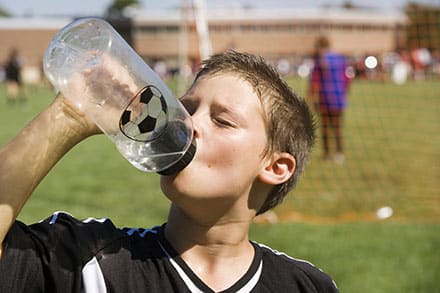
30
Sunscreen SPF
“I recommend sunscreen with an SPF of 30 or higher for most people,” says Cynthia Dolan, MD, a GMC-affiliated dermatologist. “Exposure to ultraviolet (UV) rays causes DNA damage to the skin with every skin exposure, whether it’s tan or burn. This DNA damage builds up with a delayed effect, so we don’t see it until our 20s, 30s, 40s and so on.
“At least 50 percent of the skin cancers we see occur on the face, head or neck areas,” adds Dr. Dolan. “Sunscreen is tried and true. I put it on my face, neck and ears, rain or shine, and I tell my patients to do the same.”
She recommends reapplying every 1.5 to two hours.
101
Air Quality Index Code Orange
According to the U.S. Environmental Protection Agency, an air quality index of 101 or more (Code Orange) is when pollutant levels are considered to be unhealthy for certain groups of individuals, and those people should limit outdoor exposure.
Paul Weinberg, MD, a GMC-affiliated pulmonologist, says that the elderly and people with emphysema, asthma or cardiac disease can experience illness during days when pollutant levels are deemed unhealthy.
“Individuals with asthma and emphysema have damaged airways that make them more sensitive to the environment,” says Dr. Weinberg. “Pollutants such as ozone, sulfur dioxide and nitrogen dioxide, at this point in time, are not thought to cause disease, but can make the underlying disease worse by causing inflammation in the airways.”
102
Degrees Fahrenheit
“The symptoms of heat exhaustion are over-sweating, fatigue and a core body temperature of 102 degrees Fahrenheit,” says Tim Simmons, MHA, ATC, LAT, director of the Sports Medicine Program at GMC-Duluth.
When the body loses its ability to cool and regulate itself, heat cramps, heat exhaustion and heat stroke can occur. According to the Centers for Disease Control and Prevention, heat causes more deaths in the US than any other weather event.
“From mild heat cramps to life-threatening heat stroke, heat illnesses are cumulative,” says Simmons, “so if you have one, there’s an increased chance to have another.”
6 Tips to Beat the Heat
“If you begin to feel any symptoms of heat-related illness,” Simmons says, “get out of the heat early and completely, and get your body temperature down.”
1. Get a good night’s sleep.
2. Wear light-colored lightweight clothing.
3. Hydrate properly before, during and after your activity. Avoid caffeine. Drink appropriate sports drinks to replenish lost electrolytes.
4. Avoid the outdoors between 10 a.m. and 3 p.m.
5. If you have to be outside, hydrate often and take frequent breaks out of the heat to cool off.
6. Acclimate to the heat over a period of time if possible.
For more summer tips, read Gwinnett Medical Center’s magazine, Vim & Vigor, online at gwinnettmedicalcenter.org/vigo

